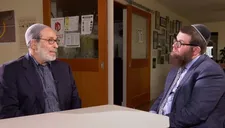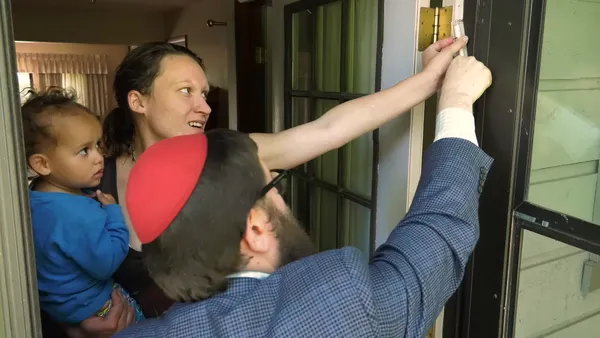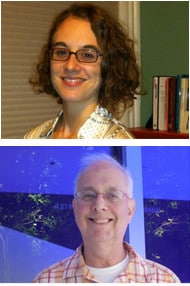The Rabbi Goes West marks the first directorial collaboration between wife and husband team, documentarian Amy Geller (The Guys Nextdoor) and film critic and filmmaker Gerald Peary (For the Love of Movies: The Story of American Film Criticism). The film sees the Boston-based couple go to Montana to document the story of young Brooklyn Hasidic Rabbi Chaim Bruk, who travelled west on a mission to connect all the Jews in the state to their faith, through the symbolic mezuzah prayer offerings on their doors. I caught up with Geller and Peary as they launch a Kickstarter fundraiser to complete the film.
Can you tell us a bit about the project – what led you to want to tell this story in Montana?
Gerald Peary: So it starts with my story. As you know, Amy and I are Jewish, and I’ve never made a movie or really written much about my own Judaism, so I decided I wanted to make a project that has something to do with my Judaism – which is extremely secular. I don’t attend synagogue. I sometimes call myself a corned beef Jew, which means I’m a cultural Jew.
One thing that I find interesting and that I care about is a mezuzah, which I have on my door. Jews have mezuzahs - what we call an encased prayer offering, with selections from the Old Testament that people put on their door. I did a lot of work on the internet and finally came across this rabbi, who is now the main character in our film. Rabbi Chaim Bruk lives in Montana and has a goal, which is to put a mezuzah on the home of every Jew in the state of Montana. That’s 1300 Jewish families in a state 14 times larger than Israel. So, I thought, ‘That’s really interesting, we can go to Montana and watch Rabbi Chaim putting up mezuzahs’. He’s obsessed with it and we know that obsession makes for a good film. I called Rabbi Chaim on the telephone and he proved to be a very funny, fast-talking rabbi, which is good for movies, and he invited us out to watch him do his thing. And that’s when Amy and I went to Montana for the first time in our lives.
Amy Geller: In the summer of 2016.
How did you feel about Gerry’s obsession with this mezuzah business by this point?
Does Rabbi Chaim find people are welcoming of his approach or does the fact that he’s very orthodox work against him in some regard?
AG: It is a way of literally getting in the door. He calls himself a salesman for Judaism, so he’s literally knocking on doors and asking to put up a mezuzah as a way of having a conversation about Judaism. By and large, people have been very welcoming. But there are some people who are not so welcoming but for the most part he’s been embraced by the Jewish community.
You talked to some of the other rabbis in the state who are perhaps following different paths of Judaism to him. Did you just find that as you were talking to people about your original idea that you just came across the additional stories as you went?
AG: We were quite surprised that not only was there this Orthodox rabbi, there was also this Reform synagogue that had been there for many years before Rabbi Chaim came. These two rabbis, because their traditions are so different, and because the Reform rabbi feels like his congregants are being poached by the orthodox rabbi, they don’t quite get along. So, the story expanded and we interviewed Rabbi Ed Stafman, who was the Reform synagogue rabbi, and it continued to expand. The wonderful thing with documentary is that you go in with a certain plan and then the story weaves its way and if you’re a good documentary maker you follow that story and you don’t always know at the beginning where you’re going to end.
How is it working together on a project like this. Obviously, as you go along, you have to decide which path you are going to take. Do you find, as a couple, that it’s easier to work together or does it bring its own frictions?
GP: We often fight like cats and dogs – is that a cliché? I think it is. We’re lovable quarrelsome people and we are both very strongly opinionated and feel we know which way to go. I want to go one way and Amy wants to go another but finally, I guess we find that little path. We’ve been doing this a couple of years.
AG: And we’re still married!
GP: There’s no passive, compliant person in this relationship.
AG: We’re both opinionated artists with our own vision but having worked with partners before, but whether you’re in a marriage or any kind of relationship, it’s a compromise and you don’t always agree on everything but it’s true that through that a better story emerges.
I know you’ve both worked with other people before but I wonder how that is when you are taking it home with you. How you leave that at the doorstep and not bring it in.
AG: We work in our house, too, so there’s no leaving it. We have a porch and it’s the one place where we go that we don’t work. Every other space is a work space and it’s very complicated to navigate it. But, I think in this case, it’s easier because we’re both so passionate about the topic and we really see the need for stories about people that aren’t necessarily about us. We don’t spend a lot of time in Orthodox Jewish communities and we’ve been given unique access to this one so we both feel a huge privilege around that and are both enthusiastic about wanting to tell that story. Our ultimate goal is the same, it’s just how we get there.
GP: To reach across – we’re liberals, going from a blue state into a red state to talk to people who seem our political opposite – in the divided world in which we live, is really important. It’s like getting a Brexit and an anti-Brexit person to talk to each other, it’s the same kind of division. But we’re like filmmakers from London going to somewhere they might consider the sticks of England to talk to somebody who is in favour of Brexit and trying to be friends with that person. That’s what we’re trying to do.
Although this is a very community-based film, it seems as though ‘bigger picture’ aspects have encroached upon it. I see there’s this aspect of one of the rabbis being targeted by a far-right group during the course of the film. Where you surprised to encounter that and how did you deal with it when you came across it because this rise of the far right is a very hot-button topic in America right now.
 |
| Rabbi Ed Stafman and Rabbi Chaim Bruk. Amy Geller: 'The wonderful thing with documentary is that you go in with a certain plan and then the story weaves its way' Photo: Amy Geller/Gerald Peary |
GP: Again, that was just something that happens as a documentarian. As we were making the film, suddenly something erupts in Montana. It’s neo-Nazis threatening to march in this little town of Whitefish. We haven’t mentioned, but we were also following a third rabbi, a woman Rabbi Francine Roston, and she is the rabbi in the town of Whitefish and she is a target of cyberattacks by neo-Nazis. So that became a part of the movie. We had no idea we were going to be talking about neo-Nazis in this town. It was actually before the famous march in Charlottesville, Virginia. It was quite shocking and quite horrible and we involved our three rabbis in this story and they reacted very differently to the neo-Nazis arriving and that also became part of the story.
Tell me about the aims of the Kickstarter you’re launching this week?
AG: So, we’ve been shooting the film on and off for two years now, going back and forth to Montana and Crown Heights, Brooklyn, which is the Hasidic headquarters of Chabad, which is the group that Chaim belongs to. So, we need to do editing, we need to fund a composer to create an original score and we want to return for one last shoot to Montana.
When do you hope to finish the film?
We want to release in 2019, probably in the spring. It’ll probably be in post-production over the winter.
In terms of your original plan for your mezuzah film, Gerry, how do you feel about where you’ve ended up from where you started?
GP: I like it a lot. My earlier documentaries have been very programmed, with piles of voice-over, telling people what to think and that’s really not the kind of documentary I like. I like an exploratory documentary, where the filmmaker is learning as the audience someday will learn and that we end up someplace different from where we started. So I am thrilled to be making this documentary for that reason.
And over on Facebook, you’ve promised to put up photos from your high school yearbooks if you get enough ‘likes’?
AG: It’s pretty fun. So, we’re going to go for it.
GP: Nobody wants to see. We need to get so many more likes, so maybe they’d rather not see our pictures.
That sounds like a challenge to me. To persuade Geller and Peary to let those photos loose on the internet, visit The Rabbi Goes West Facebook page.
To read more about The Rabbi Goes West and donate, visit their Kickstarter page.























